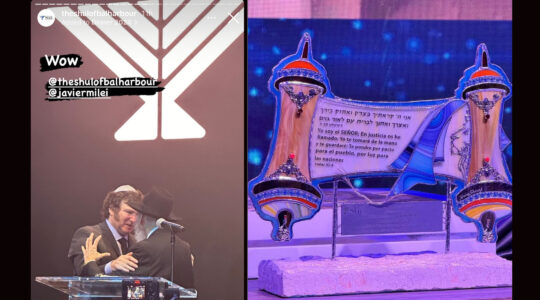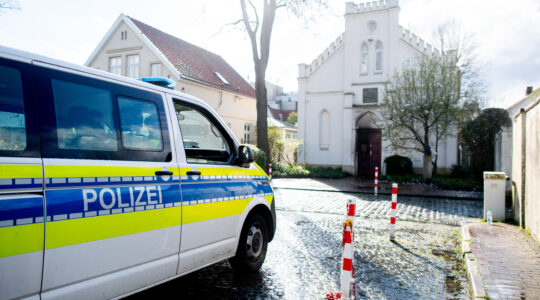MOSCOW (JTA) — If all goes according to plan for Russia’s largest Jewish organization, it won’t be long before Israel-baked
matzah becomes
a luxury item in the former Soviet Union — nice to look at but
not really necessary.
With its new matzah bakery ramping up for this Passover
season, the Chabad-led Federation of
Jewish Communities is hoping to gradually
replace imported Israeli matzah with a domestic product.
“Some people will always want matzah from Israel because they think it’s somehow holier,”
said Rabbi Avraham Berkowitz, the FJC’s executive director.The group’s effort to
distribute more than 500,000 one-kilo boxes of matzah this Passover will cost more than $1.1 million. Considering that its own matzah is sold below cost or given away
to those unable to afford the price of $1 per kilo — about 2 pounds — the FJC could enjoy massive savings if it’s able to shift to mostly domestically produced matzah.That potential for savings led Lev Leviev, the Soviet-born Israeli diamond mogul who serves as the FJC’s president and main private donor, to open Russia’s first industrial-scale matzah factory in the town of Istra, about an hour outside Moscow. Still unnamed, the factory sits in a new building on one of the FJC’s many regional campuses. Equipped with machinery imported from Israel, it’s the largest matzah factory in Russia, but not the first.Decades ago, when Jewish life was heavily suppressed by the communist regime, the Moscow Choral Synagogue operated a small matzah bakery in downtown Moscow. It stayed open even when thousands of Soviet Jews were being denied the right to emigrate and dozens were being sent to gulags for their activity in Jewish causes.That bakery did not survive the economic freedoms of the post-Soviet era, when foreign Jewish donors made it more economical to import matzah than to make it closer to home. An earlier effort by the Congress of Jewish Religious Organizations and Communities of Russia, or KEROOR, the FJC’s main rival in the FSU, to revive the Moscow bakery in a new location folded five years ago after only one year of production, due to high costs and poor quality. As it has for the past few years, KEROOR will distribute 48 tons of matzah in Russia from a Kiev bakery backed by Rabbi Ya’akov Dov Bleich, one of Ukraine’s chief rabbis. The Kiev bakery supplies four FSU countries with their matzah, which sells in Moscow for about $1.53 per kilo. With the FJC’s vastly superior funding, it hopes its new Moscow factory can succeed where previous efforts failed.The new factory produced only 150 tons in the limited inaugural run since it opened in November, and another 350 tons will be imported from Israel. By next year, however, “we expect that number to be reversed,” Berkowitz said. Production costs in Israel are approximately 50 cents per kilo higher than in Russia, and additional costs are incurred in the complicated shipping process. From Israel, the matzah is sent to port in either Moscow, Kiev, Odessa or Tashkent before heading to one of 26 regional hubs. From the hubs it goes to distribution centers in each town, many of which have only limited accessibility.That adds a $1.50 premium for shipping to each box of Israeli matzah, compared with only 50 cents to $1 per box of Russian matzah. If Berkowitz’s 2008 projections are correct, it could be as much as $200,000 cheaper to switch to locally made matzah.One reason that a cost reduction would be so welcome is the sheer scale of the FJC’s Passover distribution project. Jews from all regions congregate at
central distribution centers to receive their matzah.This year the FJC also has printed 50,000 Haggadahs and sent out 150,000 bottles of wine and grape juice. The group also has undertaken a massive advertising campaign that includes a billboard bearing the face of a smiling child who has come to be known as “the matzah boy,” right in front of Red Square.Chabad insists the factory is not intended as a business venture. The FJC says it’s selling its matzah at cost.Schneer Halpern, the Israel-born director of the Moscow bakery, sees the enterprise as a way to serve the community.”That’s the reason that the factory doesn’t have a name,” Halpern said, “because it’s not a business.”Berkowitz says the business aspect is secondary. “Logistically we are somewhat like a business,” he said, “but with one big difference: We don’t make any money.” JTA Correspondent Vladimir Matveyev in Kiev contributed to this report.





